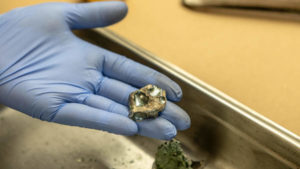DeepGreen opens path to seafloor mining
Mining
Seafloor mining for critical base metals has taken another step forward with Canadian company DeepGreen Metals producing an alloy of base metals from polymetallic nodules found on the deep ocean floor.
Using nodules obtained during a recent expedition to the four to five mile deep Clarion Clipperton Zone (CCZ) in the Pacific Ocean, DeepGreen and its onshore partner, Kingston Process Metallurgy were able to produce an iron-rich alloy containing high levels of nickel, copper and cobalt.
Replicating calcination and smelting processes that were initially developed in the 1970s, the partners also produced a manganese silicate product that could potentially be used as feedstock for the manganese-alloy industry.
DeepGreen is now conducting further testwork and engineering with the aim of starting a pilot plant next year to produce nickel, copper and cobalt without any solid waste.

The company has positioned itself as an ethical operator that won’t drill, blast or dig the bottom of the ocean.
Rather it seeks to collect the small, potato-sized polymetallic nodules that cover the seafloor in the CCZ.
“When you perform a life cycle sustainability analysis (LCSA) as we have done, and you look at the dynamic and interacting systems of the whole earth — rainforests and mountains, deserts and oceans — it becomes clear that obtaining critical base metals from ocean nodules has the least impact in terms of biodiversity, carbon, ecosystem services and human communities,” DeepGreen chief ocean scientist Greg Stone said.
The company is currently working with engineering firm Allseas to develop a deep ocean harvester and riser system that will have minimal impact on the deep sea environment to gather nodules and transport them up to a surface vessel.
DeepGreen raised US$150m in early June to fund feasibility studies into its deep sea battery metals project, which has a resource of 909 million tonnes of wet polymetallic nodules grading 1.3 per cent nickel, 29.2 per cent manganese, 1.1 per cent copper and 0.2 per cent cobalt.